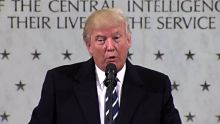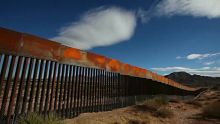The Australian dollar has topped US76¢ for the first time in more than two months as the greenback continues to weaken on worries that the Trump administration's protectionist stance will include seeking a weaker currency.
Talk of trade wars pushed the Aussie as high as US76.09¢ early Tuesday afternoon, but the currency eased back to US75.76¢ in late trade, as traders remained hesitant to push the currency higher ahead of fourth-quarter inflation data due on Wednesday.
More World News Videos
Trump's first decision affects Australia
Donald Trump has withdrawn the US from the Trans Pacific Partnership but Trade minister Steve Ciobo says other countries will still try make it work. Courtesy ABC.
Earlier, the US dollar spot index, which measures the greenback's value against a basket of major currencies, dropped below the mark of 100 for the first time since early December, falling as low as 99.89 before recovering slightly to 100.12 late on Tuesday.
US President Donald Trump has targeted trade policy in his first days in office, pulling America out of the Trans-Pacific Partnership on Monday as well as threatening a "very major" border tax for companies who shift production out of the US.
His protectionist stance is worrying investors, who in the immediate aftermath of the US election focused more on his campaign-trail promises to boost economic growth, which had supported the US dollar.
"All signs are pointing to a global trade war, said BK Asset Management director of foreign exchange strategy Kathy Lien. "Investors are worried that other countries will retaliate and any headlines related to that would be negative for the US dollar."
Sentiment for the greenback took another hit when US Treasury secretary nominee Steven Mnuchin told senators that he would fight currency manipulation and said an "excessively strong US dollar" could hurt the economy.
"The strength of the US dollar has historically been tied to the strength of the US economy and the faith that investors have in doing business in America," Mr Mnuchin said in written response to a senator's question about the implications of a hypothetical 25 per cent rise in its value. "From time to time, an excessively strong dollar may have negative short-term implications on the economy."

Mr Trump expressed concern about the US dollar's appreciation in an interview with The Wall Street Journal this month, saying the currency was "too strong".
There was a growing sense of scepticism among investors, not helped by the tone of Friday's inaugural address and subsequent spat with the media, ANZ analysts said in a note on Tuesday.
"We continue to expect the Australian dollar to move higher as opaque policies plague the new Trump administration, adding downward pressure on the US dollar," ANZ said.
But traders said it was unlikely the Aussie would push higher during the session, as markets wait for Wednesday's fourth-quarter consumer price data.
Economists are predicting headline inflation of 0.7 per cent over the quarter and core inflation (ex volatile elements such as fuel prices) of 0.5 per cent, but a higher reading could add fuel to the Aussie's rally.
"While I do not expect a positive print to have any immediate policy implications, it would continue to support the bias that the RBA's next move will be a rate hike," said Stephen Innes, senior currency trader at FX and CFD provider OANDA Australia and Asia Pacific.
Over the mid term, however, analysts said that the US dollar could actually profit from a border tax, as such a measure was likely to lift prices in the US, triggering earlier rate hikes by the Fed.
"Before the dust settles, the US dollar could and should continue to weaken against many major currencies before a border tax finally lifts the dollar," Ms Lien said.

















